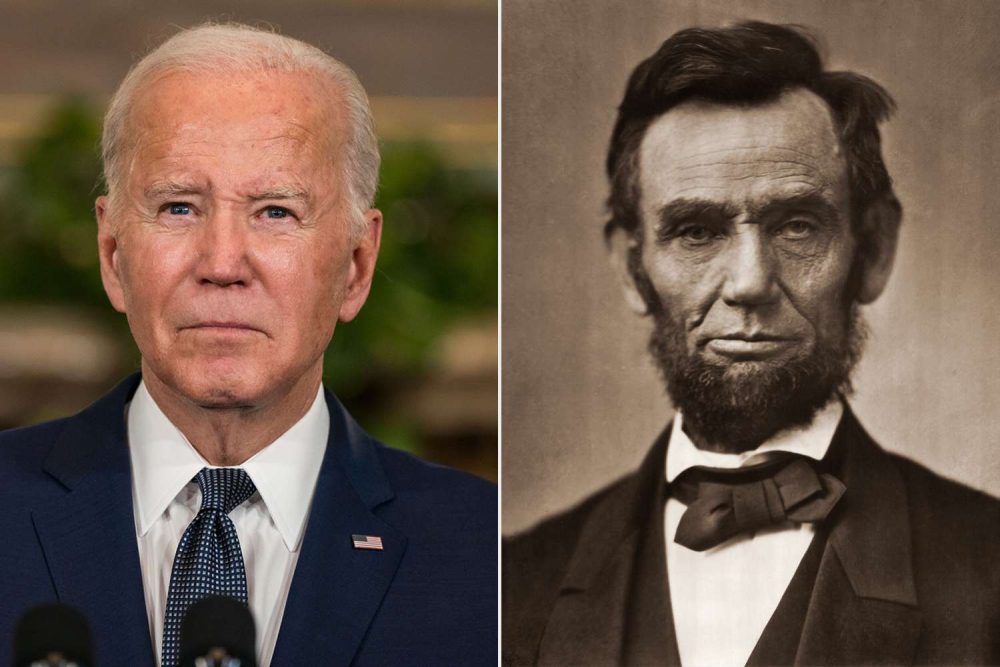Politics
REPORT: Biden’s Great-Great-Grandfather Committed Bloody Crime

Historians announced the discovery of a long-ago relative of President Joe Biden who came to blows with another man in the final years of the Civil War, resulting in a blanket pardon by President Abraham Lincoln.
According to the Washington Post, Biden’s paternal great-great-grandfather, Moses Johnson Robinette, was convicted of stabbing another Union officer after decamping from battle the night of March 21, 1864. According to records, John J. Alexander, a cook in the Union Army’s winter camp along Rappahannock River near Beverly Ford, Va., who accused him of making inappropriate comments about a female assistant, provoked Robinette into confronting him. The scuffle resulted in knife wounds to Alexander and an attempted murder charge for Robinette.
After being incarcerated on an island near Florida, Robinette was eventually pardoned by President Lincoln toward the end of the war.
President Biden’s connection to Joseph Robinette Biden, his great-grandfather, has long been established, but records listing Moses J. Robinette as his paternal ancestor only recently made the news after the soldier’s court-martial records were discovered in the National Archives in Washington.
At the outset of the Civil War in 1861, Robinette, 41, was a married hotelier in Grafton, Virginia, a pro-Union stronghold that eventually broke off with the rest of West Virginia to establish its own state. The region became a battleground between Union and Confederate forces, and Robinette’s family was not spared: his wife, Jane, died and his hotel was destroyed, allegedly by Union soldiers. He sought safety for his children, fleeing to Allegany County, Maryland where he stayed with extended family.
Between 1862 and 1863, he was assigned the role of civilian veterinary surgeon in the Union Army, tending to horses and mules used to transport soldiers and munitions along the front lines. He was confronted that night in March 1864 after Alexander asked him about a comment about a female kitchen cook he allegedly made earlier in the night. In the heat of the moment, Robinette drew his pocketknife and stabbed his confronter.
Witnesses that night described Robinette as “full of fun, always lively and joking,” though conflicting statements were issued about whether he or Alexander had consumed alcohol that night.
“[W]hatever I have done was done in self defence, that I had no malice towards Mr. Alexander before or since. He grabbed me and possibly might have injured me seriously had I not resorted to the means that I did,” Robinette said during his military court-martial, the Post reported.
The court was not convinced, handing down a two-year sentence for “attempt to kill.” After three months of bureaucratic negotiations on the terms of Robinette’s sentence, commander of the Army of the Potomac, Gen. George G. Meade, ordered him confined to the Dry Tortugas islands near Key West, Florida, known at the time as “America’s Siberia.”
The island was home to Fort Jefferson, a hulking brick fortress meant for protecting the nation’s shipping lanes along the southern coast and Gulf of Mexico. However, the need for soldiers in the Civil War resulted in the exploding prison population; by the time Robinette finished his sentence, more than 700 men called Dry Tortugas their penal home.
Robinette’s friendly demeanor may ultimately have saved him. Three friends petitioned the federal government to commute his sentence and recognize the valuable contributions he made during the war.
He was simply “defending himself and cutting with a Penknife a Teamster much his superior in strength and Size, all under the impulse of the excitement of the moment,” they wrote. At the outside of the war, they added, Robinette had been “ardent, and Influential … in opposing Traitors and their schemes to destroy the Government.”
The request reached aides to President Lincoln who commuted Robinette’s sentence a month after he reported to prison.
“Pardon for unexecuted part of punishment. A. Lincoln. Sep. 1. 1864,” Lincoln’s order said.

